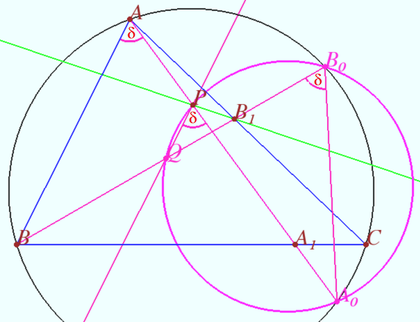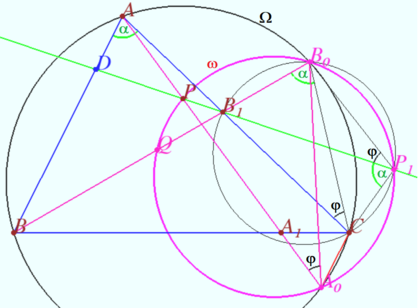Difference between revisions of "2019 IMO Problems/Problem 2"
(→Solution) |
|||
| (One intermediate revision by one other user not shown) | |||
| Line 1: | Line 1: | ||
| + | ==Problem== | ||
| + | |||
In triangle <math>ABC</math>, point <math>A_1</math> lies on side <math>BC</math> and point <math>B_1</math> lies on side <math>AC</math>. Let <math>P</math> and <math>Q</math> be points on segments <math>AA_1</math> and <math>BB_1</math>, respectively, such that <math>PQ</math> is parallel to <math>AB</math>. Let <math>P_1</math> be a point on line <math>PB_1</math>, such that <math>B_1</math> lies strictly between <math>P</math> and <math>P_1</math>, and <math>\angle PP_1C=\angle BAC</math>. Similarly, let <math>Q_1</math> be the point on line <math>QA_1</math>, such that <math>A_1</math> lies strictly between <math>Q</math> and <math>Q_1</math>, and <math>\angle CQ_1Q=\angle CBA</math>. | In triangle <math>ABC</math>, point <math>A_1</math> lies on side <math>BC</math> and point <math>B_1</math> lies on side <math>AC</math>. Let <math>P</math> and <math>Q</math> be points on segments <math>AA_1</math> and <math>BB_1</math>, respectively, such that <math>PQ</math> is parallel to <math>AB</math>. Let <math>P_1</math> be a point on line <math>PB_1</math>, such that <math>B_1</math> lies strictly between <math>P</math> and <math>P_1</math>, and <math>\angle PP_1C=\angle BAC</math>. Similarly, let <math>Q_1</math> be the point on line <math>QA_1</math>, such that <math>A_1</math> lies strictly between <math>Q</math> and <math>Q_1</math>, and <math>\angle CQ_1Q=\angle CBA</math>. | ||
| Line 4: | Line 6: | ||
==Solution== | ==Solution== | ||
| − | [[File:2019 IMO 2.png| | + | [[File:2019 IMO 2.png|420px|right]] |
| − | [[File:2019 IMO 2a.png| | + | [[File:2019 IMO 2a.png|420px|right]] |
The essence of the proof is to build a circle through the points <math>P, Q,</math> and two additional points <math>A_0</math> and <math>B_0,</math> then we prove that the points <math>P_1</math> and <math>Q_1</math> lie on the same circle. | The essence of the proof is to build a circle through the points <math>P, Q,</math> and two additional points <math>A_0</math> and <math>B_0,</math> then we prove that the points <math>P_1</math> and <math>Q_1</math> lie on the same circle. | ||
| Line 23: | Line 25: | ||
So <math>B_0P_1CB_1</math> is cyclic. | So <math>B_0P_1CB_1</math> is cyclic. | ||
| − | <math>\angle ACB_0 = \angle AA_0B_0 = \varphi</math> ( | + | <math>\angle ACB_0 = \angle AA_0B_0 = \varphi</math> (they intersept the arc <math>A_0B_0</math> of the circle <math>\Omega).</math> |
<math>\angle B_1CB_0 = \varphi.</math> | <math>\angle B_1CB_0 = \varphi.</math> | ||
| Line 33: | Line 35: | ||
'''vladimir.shelomovskii@gmail.com, vvsss''' | '''vladimir.shelomovskii@gmail.com, vvsss''' | ||
| + | |||
| + | ==See Also== | ||
| + | |||
| + | {{IMO box|year=2019|num-b=1|num-a=3}} | ||
Latest revision as of 00:49, 19 November 2023
Problem
In triangle ![]() , point
, point ![]() lies on side
lies on side ![]() and point
and point ![]() lies on side
lies on side ![]() . Let
. Let ![]() and
and ![]() be points on segments
be points on segments ![]() and
and ![]() , respectively, such that
, respectively, such that ![]() is parallel to
is parallel to ![]() . Let
. Let ![]() be a point on line
be a point on line ![]() , such that
, such that ![]() lies strictly between
lies strictly between ![]() and
and ![]() , and
, and ![]() . Similarly, let
. Similarly, let ![]() be the point on line
be the point on line ![]() , such that
, such that ![]() lies strictly between
lies strictly between ![]() and
and ![]() , and
, and ![]() .
.
Prove that points ![]() , and
, and ![]() are concyclic.
are concyclic.
Solution
The essence of the proof is to build a circle through the points ![]() and two additional points
and two additional points ![]() and
and ![]() then we prove that the points
then we prove that the points ![]() and
and ![]() lie on the same circle.
lie on the same circle.
We assume that the intersection point of ![]() and
and ![]() lies on the segment
lies on the segment ![]() If it lies on segment
If it lies on segment ![]() then the proof is the same, but some angles will be replaced with additional ones up to
then the proof is the same, but some angles will be replaced with additional ones up to ![]() .
.
Let the circumcircle of ![]() be
be ![]() . Let
. Let ![]() and
and ![]() be the points of intersection of
be the points of intersection of ![]() and
and ![]() with
with ![]() . Let
. Let ![]()
![]()
![]() since they intersept the arc
since they intersept the arc ![]() of the circle
of the circle ![]() .
.
![]() is cyclic (in circle
is cyclic (in circle ![]() )
)
Let ![]()
![]() since they intersept the arc
since they intersept the arc ![]() of the circle
of the circle ![]() So
So ![]() is cyclic.
is cyclic.
![]() (they intersept the arc
(they intersept the arc ![]() of the circle
of the circle ![]()
![]()
![]() (since they intersept the arc
(since they intersept the arc ![]() of the circle
of the circle ![]()
Hence ![]() the point
the point ![]() lies on
lies on ![]()
Similarly, point ![]() lies on
lies on ![]()
vladimir.shelomovskii@gmail.com, vvsss
See Also
| 2019 IMO (Problems) • Resources | ||
| Preceded by Problem 1 |
1 • 2 • 3 • 4 • 5 • 6 | Followed by Problem 3 |
| All IMO Problems and Solutions | ||











